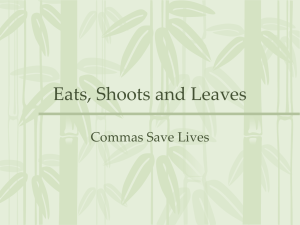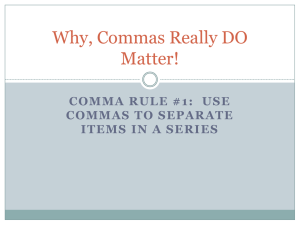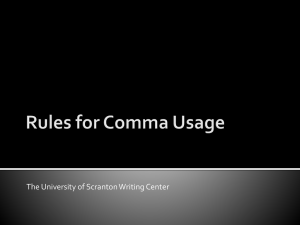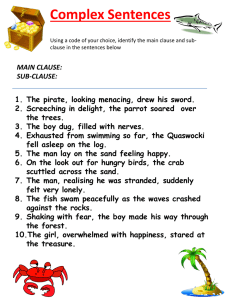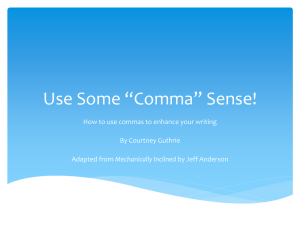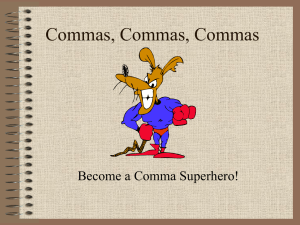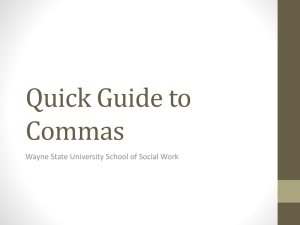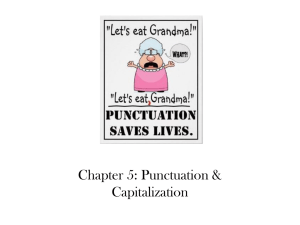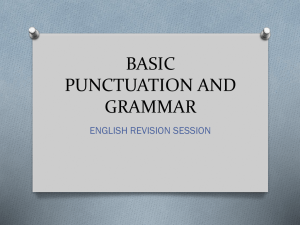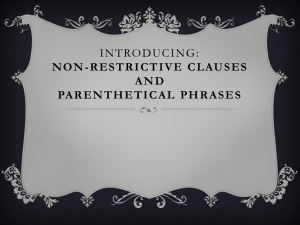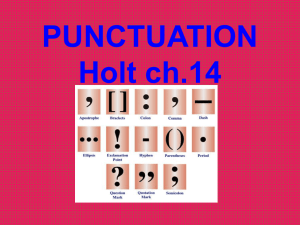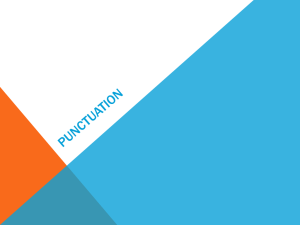Commas and Other Usage
advertisement
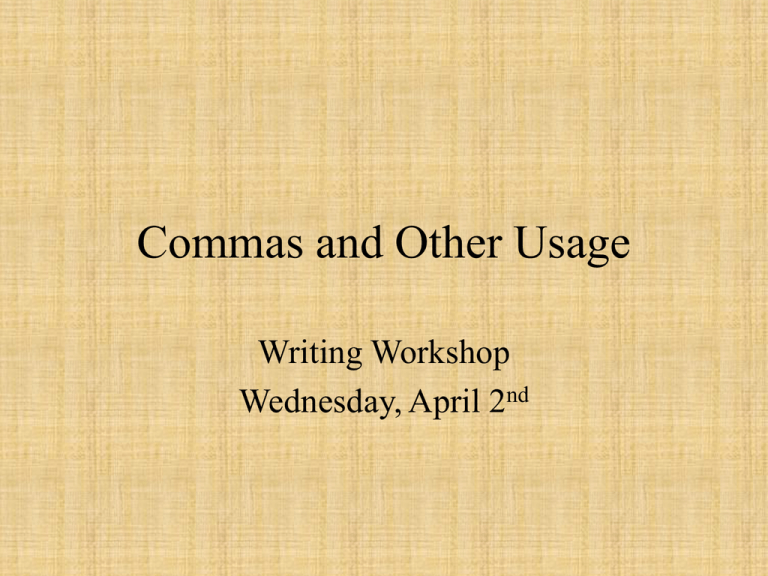
Commas and Other Usage Writing Workshop Wednesday, April 2nd Before We Get to Commas What is a sentence? S V O I love this flavor. Before We Get to Commas You can extend it with a prepositional phrase. S V O I love this flavor of ice cream. Before We Get to Commas You can extend it with a subordinated clause. S V O conj. S V I love this flavor of ice cream because it is delicious. Before We Get to Commas And you can extend it with a coordinate clause. S V O conj. S V I love this flavor of ice cream because it is conj.S V delicious, and it reminds me of home. Comma Rules There is no limit on how many commas you can use in a sentence, as long as each comma is following a rule. Commas are only wrong when a rule is broken or when they are applied incorrectly. Rule 1 Use commas to separate words, phrases, or clauses in a list or series. Rule 1 Use commas to separate words, phrases, or clauses in a list or series. 1. A worthwhile philosophy includes honesty, industry, and kindness. 2. John, David, and Mark left the store. 3. Maria bought flowers, drove to Alejandra’s house, and gave her the flowers. Rule 2 Use a comma to set off introductory words, phrases, and clauses from the sentence. Rule 2 Use a comma to set off introductory words, phrases, and clauses from the sentence. 1. After the storm was over, we went home. 2. In 1516, soldiers were hired as mercenaries. 3. Yes, I will be there. 4. Having eaten dinner, Juan fell asleep. Rule 3 Use commas to set off interrupting words, phrases, and clauses. Rule 3 Use commas to set off interrupting words, phrases, and clauses. 1. Jane, who is my best friend, has asked me to be a bridesmaid. 2. Jonathan will, in fact, serve on the committee. 3. I, for one, love learning about grammar. Rule 4 Use commas before afterthoughts. Rule 4 Use commas before afterthoughts. 1. She kept leaving money in my jar, not that I had a problem with it. 2. Can we meet up sometime, maybe after class? 3. Joanna stayed at home, never realizing what was outside. Rule 5 Use a comma with a conjunction (and, but, or, so, for, yet) to make a compound sentence. Rule 5 Use a comma with a coordinating conjunction (for, and, nor, but, or, yet, so) to make a compound sentence. 1. David is talking, but no one is listening. 2. Protestors continue to march, yet nothing changes. 3. I hate reading, so I’m bad at writing. Rule 6 Use commas in addresses and dates. Rule 6 Use commas in addresses and dates. 1. Hal lives at 222 Joy Street, Dayton, Ohio. 2. He was born on December 22, 1967. 3. On December 7th, 1941, the Japanese Navy attacked Pearl Harbor. Rule 7 Use commas with direct quotations. Rule 7 Use commas with direct quotations. 1. “I have to study for the math test,” my sister complained. 2. “I wish,” commented Andrea, “that you wouldn’t call me so early in the morning.” 3. David Mulroy argues, “Grammar is rarely taught these days.” Rule 8 Use commas with words of direct address. Rule 8 Use commas with words of direct address. 1. Maria, come over here. 2. I wish, Xiomara, that you would come over later. 3. Are you ready, Gerardo? Rule 9 Use a comma to set off contrasting expressions or to show emphasis. Rule 9 Use a comma to set off contrasting expressions or to show emphasis. 1. Not only is the food good, but the music is fantastic. 2. The book was Frank’s, not Hal’s. 3. The bigger they are, the harder the fall. Other Usage Rules I. Form the possessive singular of nouns with 's. David’s presentation; the dog’s bone II. Do not break sentences in two. (Don’t use periods for commas.) I tend to get sick a lot. Especially when it’s cold. I like her. But not him. Other Usage Rules III. A participial phrase at the beginning of a sentence must refer to the grammatical subject. (Dangling Modifier) *Walking home, my backpack fell. Walking home, I dropped my backpack. IV. The number of the subject determines the number of the verb. (SV Agreement) I walk, You walk, We walk, They walk He walks, She walks, It walks Common Mistakes I. There, Their, They’re I saw him there. Have you met the Robinsons? Their house is amazing. Help Joe and Claudia with the chores. They’re having trouble. Common Mistakes II. Who/Whom Address the letter to whomever it concerns. I don’t know anyone who would like that movie. III. To, Two, Too I want to go to the beach. I would like two raspas. This raspa has too much ice and not enough syrup. Common Mistakes IV. Lay/Lie Everyday, I lie down on my bed. Yesterday, I lay on my bed. Emilio, lay that book down on the table, please. V. A, An, The I have a book; she has an apple. Give me the book; give me the apple. Common Mistakes VI. This, These, That, Those Grab this book (close by). Grab these books (close by). Grab that book (over there). Grab those books (over there). Common Mistakes VII. Adverbial Conjunctions (however, therefore, moreover, furthermore, consequently, etc.) NOT although or though I enjoy classic movies; therefore, I go on Sunday evenings. I enjoy classic movies. Therefore, I go on Sunday evenings.
